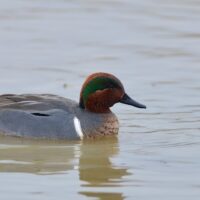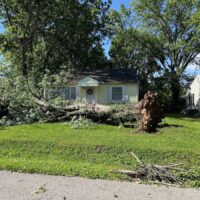Kentucky residents who have bird feeders should immediately clean them with a 10% bleach solution and repeat the cleaning weekly until wildlife officials determine what is killing songbirds here and in several other states.
That is the advice the Kentucky Department of Fish and Wildlife issued this week in response to reports of sick and dying birds in Jefferson, Kenton and Boone counties.
“We haven’t been able to come up with one definite answer,” said Dr. Christine Casey, the state’s wildlife veterinarian.
Casey, who spoke Wednesday in a video conference and took questions from news reporters, said officials are awaiting results of laboratory tests on bird carcasses. Some tests can take four weeks or longer to process, she said.
The affected birds have swollen eyes with a crusty discharge. Casey said some also have neurological problems and might appear to be stumbling around.
“We don’t know what’s causing it,” she said.
- SUBSCRIBE: Sign up for Hoptown Chronicle’s newsletters
The illness is mainly affecting blue jays, grackles and European starling, said Casey.
Other states that have reported the illness include Maryland, West Virginia, Indiana, Virginia and Ohio — along with Washington, D.C.
Brian Evans, a Smithsonian Migratory Bird Center ornithologist who studies the urban bird population around Washington, D.C., told NPR that one hypothesis for the illness is a link to Brood X cicadas emergence. There is speculation that birds become ill “after eating cicadas tainted by pesticides or insecticides, or possibly being sickened by a fungus that attacks cicadas,” NPR reported.
Anyone who sees dead or sick birds is asked to file an online report Kentucky Department of Fish and Wildlife. More than 700 reports had been submitted by Wednesday, but that does not mean all of those reports are linked the unexplained illness, said Casey.
People should avoid handling birds. Disposable gloves should be used when removing dead birds, according to guidance from the state agency.
Residents of Jefferson, Boone and Kenton counties have been asked to stop feeding birds until further notice.
Jennifer P. Brown is co-founder, publisher and editor of Hoptown Chronicle. You can reach her at editor@hoptownchronicle.org. Brown was a reporter and editor at the Kentucky New Era, where she worked for 30 years. She is a co-chair of the national advisory board to the Institute for Rural Journalism and Community Issues, governing board past president for the Kentucky Historical Society, and co-founder of the Kentucky Open Government Coalition. She serves on the Hopkinsville History Foundation's board.





